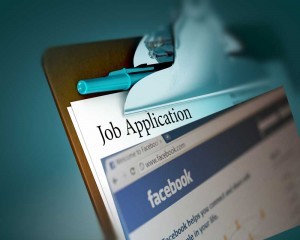Everyone prepares as best as they can for a job interview: professional clothes, practicing answers to the typical questions, and asking past employers for references. But there is a process more and more employers are adopting that you may be unprepared for. More employers are turning to social media profiles to screen applicants either: after receiving an application, after an interview, or before hiring the person.
 What Are The Exact Statistics?
What Are The Exact Statistics?
Reppler conducted a survey of over 300 hiring professionals, and came out with these results:
- 91% reported that they use social networking sites to screen prospective employees
- 69% have rejected a candidate because of what was posted on their social media accounts
- During this screening process, respondents reported that they use the following social media platforms to screen employees:
- 76% Facebook
- 53% Twitter
- 48% LinkedIn
The social media platform (LinkedIn) created as a professional platform for potential employers, is used the least in the screening process.
Why Is This An Issue?
This screening process is an issue because social media platforms such as Facebook and Twitter are deemed to be “personal” social media accounts, and cannot be guaranteed to be a direct reflection of the individual’s professional performance. Often times, people act very differently when in a professional environment compared to when they are with friends or family. Social media profiles are a digital version of “hanging out with peers,” and are not used as a platform to set a professional example by users.
Furthermore, despite the popularity of this screening process, few organizations have adopted company policies on how this process should be conducted. As a result, the hiring manager is left to his or her own discretion in making decisions. There are no guidelines for them to follow, and they get to decide how extensively they can research your accounts, and what is “unacceptable” in their opinion.
The Legal Aspect
So, is screening potential employee’s social media accounts legal? In the United States, states such as California and Illinois, have passed “a law that prohibits employers from requiring applicants and employees to allow them access to social media sites” (CKR Global, 2012.) In Canada, “companies generally cannot screen potential hires, even through social media, if the process will: violate a person’s privacy rights or break employment discrimination laws (CKR Global, 2012.) However, there are grey areas in this sector, and companies can find ways around these legal restrictions, such as not informing candidates that they were screened, in order to avoid legal action against the company.
What Can You Do?
While there are legal and ethical issues with this screening process, the fact of the matter remains that more and more companies are adopting this process. Companies feel that they need to protect themselves, and social media profiles can give them an insight into what a candidate is truly like. The only preventative measures individuals who are applying for jobs can take is: to increase privacy settings on all social media profiles to block out snooping hiring managers, or simply “clean up” your social media accounts to give a more professional impression.
Warning: It Doesn’t Stop After You’ve been Hired
Getting the job does not guarantee job security. There have been numerous cases of people being fired for social media posts. Companies have a legal right to do this if an employee has damaged the company’s reputation, or acted in a way that would negatively impact the company, or have admitted on their social media accounts to not doing their job.
- Several teachers have been fired for inappropriate social media posts throughout the world. Teachers are public figures that are in a position of authority, and are highly influential in their students’ lives. As a result, they are expected to act appropriately even when outside of school. A teacher from Denver was fired after she tweeted about her student’s being “hot” and about how she likes to smoke weed.
- A city clerk in Washington quit after she was reprimanded for tweeting during official city meetings rather than keeping track of the meeting minutes.
- An employee of a Detroit power company posted a Facebook rant swearing at her customers, and was consequentially fired.
 Social media profiles are not private, and it is considered social media etiquette to monitor your public posts to be considerate and non-offensive.
Social media profiles are not private, and it is considered social media etiquette to monitor your public posts to be considerate and non-offensive.
References:
Broderick, Ryan. (2013, June 6). “10 People Who Learned Social Media Can Get You
Fired.” CNN.com. Retrieved from http://www.cnn.com/2013/06/06/living/buzzfeed-
social-media-fired/.
CKR Global. (2012, October 25). “Social Media Can Be a Legal Minefield When Screening
Job Applicants. CKR Global. Retrieved from https://ckrglobal.com/social-media-can-
be-legal-minefield-when-screening-job-applicants/.
Guest. (n.d.) How Employers Use Social Media to Screen Applicants. Undercover
Recruiter. Retrieved from http://theundercoverrecruiter.com/infographic-how-
recruiters-use-social-media-screen-applicants/.
Klimas, Liz. (2013, November 22). ” ‘They Got F***** Up’: Energy Company Employee
Fired for Facebook Rant Against Those Without Power After Storm.” The Blaze.
Retrieved from http://www.theblaze.com/stories/2013/11/22/they-got-f-up-energy-
company-employee-fired-for-facebook-rant-against-those-without-power-after-storm/.
Lee, Henry K. (2014, May 20). Tweeting Clerk Quits, Tells Pleasant Hill What She Really
Thinks. SF Gate. Retrieved from http://blog.sfgate.com/stew/2014/05/20/tweeting-
official-quits-tells-pleasant-hill-what-she-really-thinks/.










